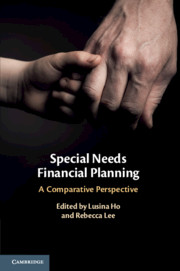51 results
5 - An Asian Approach to Mental Capacity for Wills and Lasting Powers
- from Part I - The Rise of Asian Wealth
-
-
- Book:
- Trusts and Private Wealth Management
- Published online:
- 08 December 2022
- Print publication:
- 22 December 2022, pp 69-88
-
- Chapter
- Export citation
8 - Protecting Investors of Collective-Investor Trusts in China
- from Part II - The Scope of Investor Protection Regulation
-
-
- Book:
- The Cambridge Handbook of Investor Protection
- Published online:
- 20 October 2022
- Print publication:
- 27 October 2022, pp 153-168
-
- Chapter
- Export citation
Annex A - Summary Workflow of SNTC’s Trust Service
- from 11 - SNTC’s Operational Experience as Singapore’s First Non-Profit Trust Company
-
- Book:
- Special Needs Financial Planning
- Published online:
- 28 June 2019
- Print publication:
- 04 July 2019, pp 327-327
-
- Chapter
- Export citation
Table of Legislation
-
- Book:
- Special Needs Financial Planning
- Published online:
- 28 June 2019
- Print publication:
- 04 July 2019, pp xxiv-xxviii
-
- Chapter
- Export citation
Index
-
- Book:
- Special Needs Financial Planning
- Published online:
- 28 June 2019
- Print publication:
- 04 July 2019, pp 365-368
-
- Chapter
- Export citation
Figures
-
- Book:
- Special Needs Financial Planning
- Published online:
- 28 June 2019
- Print publication:
- 04 July 2019, pp vii-vii
-
- Chapter
- Export citation
Annex B - Best Interests Framework
- from 11 - SNTC’s Operational Experience as Singapore’s First Non-Profit Trust Company
-
- Book:
- Special Needs Financial Planning
- Published online:
- 28 June 2019
- Print publication:
- 04 July 2019, pp 328-328
-
- Chapter
- Export citation
Copyright page
-
- Book:
- Special Needs Financial Planning
- Published online:
- 28 June 2019
- Print publication:
- 04 July 2019, pp iv-iv
-
- Chapter
- Export citation
13 - Reforming Enduring Powers and Launching a Special Needs Trust in Hong Kong
- from Part III - Special Needs Trust
-
-
- Book:
- Special Needs Financial Planning
- Published online:
- 28 June 2019
- Print publication:
- 04 July 2019, pp 348-364
-
- Chapter
- Export citation
Table of Cases
-
- Book:
- Special Needs Financial Planning
- Published online:
- 28 June 2019
- Print publication:
- 04 July 2019, pp xx-xxiii
-
- Chapter
- Export citation
Part III - Special Needs Trust
-
- Book:
- Special Needs Financial Planning
- Published online:
- 28 June 2019
- Print publication:
- 04 July 2019, pp 237-364
-
- Chapter
- Export citation
Part I - Adult Guardianship
-
- Book:
- Special Needs Financial Planning
- Published online:
- 28 June 2019
- Print publication:
- 04 July 2019, pp 1-114
-
- Chapter
- Export citation
Contents
-
- Book:
- Special Needs Financial Planning
- Published online:
- 28 June 2019
- Print publication:
- 04 July 2019, pp v-vi
-
- Chapter
- Export citation
Part II - Lasting/Enduring Power of Attorney
-
- Book:
- Special Needs Financial Planning
- Published online:
- 28 June 2019
- Print publication:
- 04 July 2019, pp 115-236
-
- Chapter
- Export citation
Preface
-
- Book:
- Special Needs Financial Planning
- Published online:
- 28 June 2019
- Print publication:
- 04 July 2019, pp xv-xix
-
- Chapter
- Export citation
Contributors
-
- Book:
- Special Needs Financial Planning
- Published online:
- 28 June 2019
- Print publication:
- 04 July 2019, pp ix-xiv
-
- Chapter
- Export citation
Tables
-
- Book:
- Special Needs Financial Planning
- Published online:
- 28 June 2019
- Print publication:
- 04 July 2019, pp viii-viii
-
- Chapter
- Export citation

Special Needs Financial Planning
- A Comparative Perspective
-
- Published online:
- 28 June 2019
- Print publication:
- 04 July 2019
Research Handbook on Fiduciary Law. Edited by D. Gordon Smith and Andrew S. Gold. [Cheltenham and Northampton, MA: Edward Elgar Publishing, 2018. xviii + 448 pp. Hardback £180. ISBN 978-01-78471-482-6.]
-
- Journal:
- The Cambridge Law Journal / Volume 78 / Issue 1 / March 2019
- Published online by Cambridge University Press:
- 23 April 2019, pp. 220-222
- Print publication:
- March 2019
-
- Article
- Export citation
2 - ‘Breaking Bad’
- from Part I
-
-
- Book:
- Trusts and Modern Wealth Management
- Published online:
- 19 April 2018
- Print publication:
- 31 May 2018, pp 34-56
-
- Chapter
- Export citation



